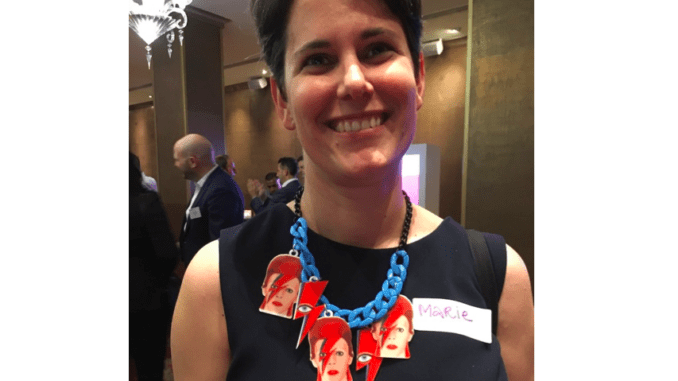
Marie Bernard is the CEO of Nextlaw Labs, the innovation accelerator set up by global law firm Dentons, in 2015. Artificial Lawyer caught up with Bernard to find out where the group is now and what its main goals are today.
Bernard (pictured above) notes that the first thing people should know is that Nextlaw Labs is not the investment arm of Dentons. Instead, investment in startups comes via Nextlaw Ventures, now run by Dan Jansen, the previous boss of Nextlaw Labs.
Amongst other things, Nextlaw Ventures puts money into the startups that Nextlaw Labs then accelerates, and acts as a minority investor for some very famous names, including the likes of ROSS Intelligence and Clause.
The Transformation Goal
But, that is not where Nextlaw Labs is at, and especially so today. Bernard’s mantra is simple, but powerful.
‘Labs was initially focused on startups, but we need to broaden it,’ she explains. ‘Startups are just one way of accelerating business transformation.’
So what is this really about? It is about value-adding, practical and realistic innovation that helps Dentons, its affiliated firms and its clients, which when combined actually helps to transform the business.
How Nextlaw Labs gets there is not really the key challenge. The challenge is to get there.
‘Incubators have many positives, they open the minds of lawyers to technology,’ says Bernard, but this is not enough.

This could be building a solution internally, or it could mean working with a tech company to deliver what they need. In short, it’s not just about startups and hoping they evolve into the solution you want.
‘We want to be able to create things that are not in the market,’ she stresses.
Bernard also notes that because Dentons’ reach is global, Nextlaw Labs also looks at the legal tech world as a whole. For example, if a useful application exists in Europe, they can see if it can be applied in the US.
And, it’s probably fair to say, if one of the legal tech giants came up with a great new solution to a specific need it would be taken on-board as well.
The point here is that there is no deliberate bias toward startups now, even if that may have appeared to be the case in the past. It’s just that, as always, many of the great new ideas and solutions do in fact come from startups.
Market Evolution
Equally, some startups where Nextlaw Labs had input early on are very much doing their own thing these days, such as ROSS, the legal research company. The firm’s bankruptcy team does use ROSS, but, like many other early developers the company has evolved a lot under their own steam.
In fact, market evolution is something Nextlaw Labs is considering, i.e. as the first big wave of legal tech startups that hit the market’s awareness in 2015 and 2016 starts to mature, maybe then there will be consolidation.
‘We don’t want Nextlaw Labs to be the education department, we are the transformation department.’
Bernard notes that as startups grow they become more focused on APIs and linking with other types of software. Or, as is the case with Clause and the smart contract standards initiative, the Accord Project, there is the real hope of standardised approaches becoming accepted by many law firms and clients.
In short, there is a steady movement toward integration and standardisation.
This doesn’t mean that Thomson Reuters and LexisNexis will eventually absorb the competition. Bernard notes that we could see the formation of one or two other legal tech ‘pillars’ in the market that have huge scale and a variety of applications on offer. And she could be right.
The Path Ahead
So, what now for Nextlaw Labs?
‘There is a strong appetite for education (about legal tech) at the firm. And more lawyers want to sign up to play a part in pilots,’ says Bernard.
‘BUT,’ she adds, importantly, ‘We don’t want Nextlaw Labs to be the education department, we are the transformation department.’
In short, Bernard wants to drive real change now. Education is important, but more lawyers are getting up to speed without needing to depend on Nextlaw Labs. Moreover, education on its own, one could say, is a waste of Nextlaw Labs’ energy and talent. They want real change, other parts of the firm can help with education.
‘We aim to take a strategic lead, along with the KM team, to see what there is now and what could be done,’ she concludes.

This then integrates with what Bernard calls their ‘global ideation platform’, that looks at tech solutions from a global and multi-level perspective, taking into account that not every office needs ‘a premium solution’ to get the job done.
Ultimately, what matters is that it works and does what is needed by the lawyers and clients that will use it.
It’s the ‘real politik’ of legal tech. And that’s got to be applauded.
[ Photo credit, RT. Pic of Marie Bernard, at Barclays Eagle Labs Legal Tech launch party in London, June 2018. ]